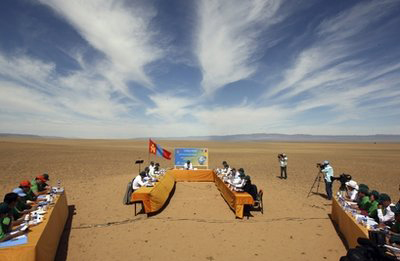蒙古國政府12位部長級官員上周五齊聚在南戈壁省一處被沙漠覆蓋的山谷中參加內閣會議,討論全球氣候變化對蒙古國帶來的影響。該會議地點距離首都烏蘭巴托670公里,所有桌椅都擺在金黃色的沙地上,附近還插了一面蒙古國旗。參會的官員要乘坐吉普車在沙漠中行進15個小時才能到達會議地點,所有官員均穿西裝打領帶,頭戴寫有“拯救地球”字樣的深綠色棒球帽。在一個小時的會議中,官員們討論了全球變暖對蒙古國產生的影響,稱氣候變暖導致的干旱使得該國沙漠化形勢日漸嚴重,而去年冬天的極端惡劣氣候也致使該國五分之一的牲畜死亡。官員們希望此舉能夠引起全世界各國對氣候變化的關注,同時期盼11月份在墨西哥召開的氣候對話大會能夠做出相關決議,在應對氣候變化和沙漠化方面對發展中國家提供優惠政策。

 |
|
A Cabinet meeting aimed at drawing attention to climate change is held in Gashuunii Khooloi, a sandy valley in South Gobi province, Mongolia. |
Top Mongolian officials donned dark green baseball caps reading "Save our planet" and set up chairs and tables in the sands of the Gobi desert for a Cabinet meeting aimed at drawing attention to climate change.
The meeting of 12 government ministers was held in scorching heat Friday in Gashuunii Khooloi, a sandy valley in South Gobi province, about 415 miles (670 kilometers) south of Ulan-Bator, the country's capital.
The ministers, dressed in suits and ties, arrived in the desert in jeeps after a 15-hour journey. Officials planted a Mongolian flag in the ground, set up long tables and chairs in the fine, golden sand and discussed climate change against the backdrop of a vast expanse of desert and a bright blue sky.
"Mongolia is feeling the impact of global climate change," Prime Minister Batbold Sukhbaatar said at the one-hour meeting.
Batbold pointed to the recent winter as an example of problems Mongolia faces. The winter was the harshest in decades and a fifth of the country's livestock died.
The government blames global warming for a decrease in rainfall and says that rising average temperatures have caused many rivers and springs to dry up and snow cover to melt. It also says the frequency of natural disasters and drought has jumped.
The site for the meeting was chosen because parts of it used to be arable land, said Badarch, head of social policy for South Gobi province, who like some Mongolians uses only one name.
"Five years ago, there used to grow many edible plants in this valley and there were fewer sand dunes. Now look here," he said. "The valley is completely covered with sand. The sand dunes are moving and taking more space each year."
Minister of Natural Environment and Tourism Gansukh Luumed said Mongolian herders' traditional way of life is under threat. "Global climate change accelerates the desertification process in Mongolia. Currently, 70 percent of Mongolian land is affected by desertification."
In December, Nepalese officials held a Cabinet meeting at Mount Everest to highlight the danger global warming poses to glaciers. It followed an underwater Cabinet meeting in the Maldives in October to underline the threat of rising sea levels.
The government said it hoped that delegates attending global climate talks in Cancun, Mexico, in November would reach a decision that is "favorable for landlocked, developing countries ... very much affected by climate change and desertification."
相關閱讀
(Agencies)

(中國日報網英語點津 Helen 編輯)